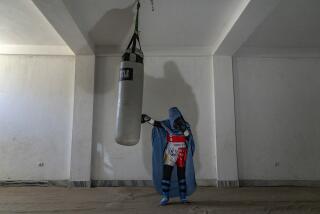Afghans vote despite rain, Taliban threats
MAIDAN SHAHR, Afghanistan — For weeks, the Taliban circulated threats in Sher Agha’s rural district that anyone who participated in Saturday’s election in Afghanistan would be punished or killed.
So the night before the vote, the 52-year-old farmer drove a half-hour to this quiet provincial capital where government security forces patrol the streets. Early Saturday morning, draped in a mustard-colored shawl to ward off the chill and spitting rain, he cast his ballot in a pivotal election that will determine Afghanistan’s next president and could reshape its relations with the United States.
“People should be proud to vote,” Sher Agha said outside the provincial government compound that was serving as Maidan Shahr’s main polling center. “But where I live, people are afraid they might be killed if they vote.”
Staring down security threats and memories of voter fraud, Afghans trekked through deserted streets and rain-swept fields to polling places across the country to select a successor to President Hamid Karzai in an election that features three well regarded front-runners, none of whom was expected to gain the absolute majority needed to win.
Final results were due to be announced in a few weeks, after which a runoff would be held between the top two vote-getters, if needed.
In cities and towns like Maidan Shahr, an hour’s drive from Kabul in restive Wardak province, voting appeared to proceed smoothly with robust lines, plenty of Afghan soldiers and police keeping watch, and relatively little of the Taliban violence and ballot-box irregularities that marred the last two Afghan elections.
Turnout in 2009 and 2010 elections was low, and officials had hoped that more voters would cast ballots this time around with no incumbent in the presidential race. Karzai was constitutionally barred from seeking a third term. Voters were also selecting candidates for the regional advisory boards known as provincial councils.
By 11 a.m., four hours after polls opened, the Independent Electoral Complaints Commission, the government-appointed election watchdog, said it had received about 200 complaints. They ranged from voting stations that opened late to reports that candidates or authorities had interfered with voting in the provinces, said the commission’s spokesman, Nader Mohseni.
“Until now we have not received any very, very serious complaints,” Mohseni said. “We hope everything is going well.”
But most of Afghanistan’s population is rural, and officials cautioned that the picture wasn’t yet clear in villages and remote areas, particularly those where the government exercises little control. They include parts of Wardak, where Sher Agha and local officials said Taliban threats would keep many residents, particularly women, from voting and several polling stations would not open.
Low turnout and little official oversight of the balloting in rural areas could open the door for vote rigging, experts have warned, because of the ability of political partisans to buy off election staff and security forces. By midafternoon, at least one such effort had been exposed, with the Afghan interior ministry announcing that it had arrested police and intelligence officers for stuffing five ballot boxes in Sayedabad, one of Wardak’s most troubled districts.
There were reports of minor clashes between security forces and armed militants in a handful of provinces. Outside Gardez, a provincial capital in eastern Afghanistan, a voter was shot dead by Taliban gunmen, officials said.
Later in the day, witnesses reported through social media that polling stations in several provinces had run out of paper ballots. And election officials extended voting by one hour, to 5 p.m., because of the late opening of some polling stations.
There were no reliable opinion polls but the three apparent presidential front-runners all were experienced officials who have pledged to strengthen ties with the United States, which have become badly strained under Karzai. They were Abdullah Abdullah, who finished second to Karzai in the fraud-marred 2009 election; Ashraf Ghani, a U.S.-trained economist and former finance minister; and Zalmai Rassoul, a physician and longtime Karzai advisor.
In the run-up to the election, U.S. officials maintained a studied silence on the candidates but privately expressed optimism that each had pledged to sign a long-awaited security agreement that would allow a few thousand American troops to remain in Afghanistan beyond 2014. Pentagon officials believe the residual force is necessary to conduct counterterrorism operations, train Afghan forces and safeguard regional interests including stability in neighboring Pakistan.
American troops have withdrawn to the sidelines in Afghanistan and did not play a role in the election. Nearly 200,000 Afghan soldiers and police were deployed to protect more than 6,000 polling centers.
In a sign of increased voter interest, Afghan officials handed out 3.8 million new voter cards, a significant amount considering that total turnout in the 2009 election was about 4.6 million.
Abdul Hamid, a 50-year-old government employee who voted in Maidan Shahr, said he waited for three days last week to get his voter card. “There were so many people in line who wanted to make sure they could vote today,” he said.
In line in front of him was Shaherab, an 18-year-old college student who wore a faux leather jacket and a wide smile. “It’s my first election,” he said. “I came to elect a loyal president who will bring peace and stability to our country.”
ALSO:
South Korea finds two crashed drones, suspects North Korea
Report of ping raises hope, questions in Malaysia jetliner search
Afghan election concludes: Little violence, lots of votes to count
Twitter: @SBengali
More to Read
Start your day right
Sign up for Essential California for news, features and recommendations from the L.A. Times and beyond in your inbox six days a week.
You may occasionally receive promotional content from the Los Angeles Times.







